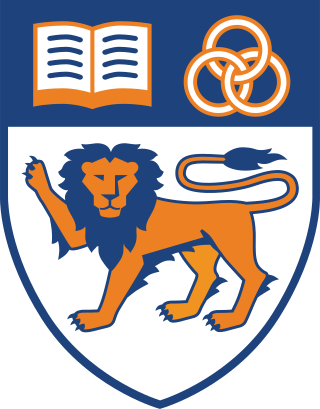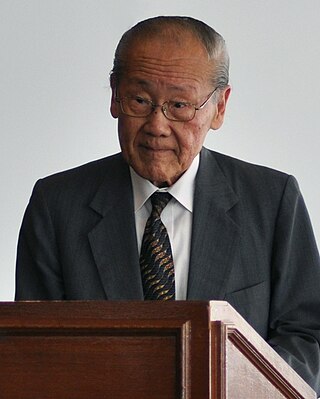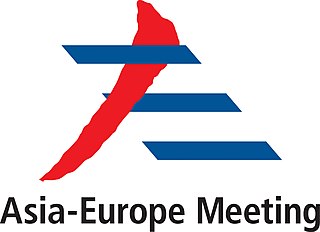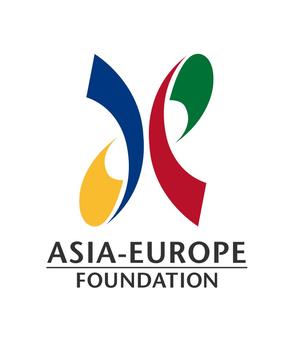Related Research Articles

A think tank, or policy institute, is a research institute that performs research and advocacy concerning topics such as social policy, political strategy, economics, military, technology, and culture. Most think tanks are non-governmental organizations, but some are semi-autonomous agencies within government, and some are associated with particular political parties, businesses or the military. Think tanks are often funded by individual donations, with many also accepting government grants.

The National University of Singapore (NUS) is a national public collegiate and research university in Singapore. It was officially established in 1980 by the merger of the University of Singapore and Nanyang University.

Wang Gungwu, is an Australian historian, sinologist, and writer specialising in the history of China and Southeast Asia. He has studied and written about the Chinese diaspora, but he has objected to the use of the word diaspora to describe the migration of Chinese from China because both it mistakenly implies that all overseas Chinese are the same and has been used to perpetuate fears of a "Chinese threat", under the control of the Chinese government. An expert on the Chinese tianxia concept, he was the first to suggest its application to the contemporary world as an American Tianxia.

The Asia–Europe Meeting (ASEM) is an Asian–European political dialogue forum to enhance relations and various forms of cooperation between its partners. It was officially established on 1 March 1996 at the 1st ASEM Summit (ASEM1) in Bangkok, Thailand, by the then 15 Member States of the European Union (EU) and the European Commission, the then 7 Member States of the Association of Southeast Asian Nations (ASEAN), and the individual countries of China, Japan, and South Korea. A series of enlargements saw additional EU Member States join as well as India, Mongolia, Pakistan and the ASEAN Secretariat in 2008, Australia, New Zealand and Russia in 2010, Bangladesh, Norway, and Switzerland in 2012, as well as Croatia, and Kazakhstan in 2014.

The G20 or Group of 20 is an intergovernmental forum comprising 19 sovereign countries, the European Union (EU), and the African Union (AU). It works to address major issues related to the global economy, such as international financial stability, climate change mitigation and sustainable development.
The Institute of Policy Studies (IPS) is a think-tank that studies and generates public policy ideas in Singapore. Established in 1988, IPS became an autonomous research centre of the Lee Kuan Yew School of Public Policy at the National University of Singapore in 2008. A centre for social indicators research, Social Lab, was set up by IPS in November 2013. The board of directors at the institute includes high ranking Singapore government officials, diplomats, directors of multinational businesses, and leaders of academic institutions.
Tommy Koh Thong Bee is a Singaporean diplomat, lawyer, professor and author who served as Singapore's Permanent Representative to the United Nations between 1968 and 1971.

The Asia–Europe Foundation (ASEF) is an intergovernmental not-for-profit organization located in Singapore. Founded in 1997, it is the only institution of the Asia-Europe Meeting (ASEM). Its purpose is to promote mutual understanding and cooperation between the people of Asia and Europe through intellectual, cultural, and people-to-people exchanges.

Jean-Jacques Subrenat is a French diplomat who served as ambassador, permanent representative to the Western European Union in Brussels (1995–1998), ambassador to Estonia (1998–2002) and to Finland (2002–2005). He represented France at the Board of Governors of the Asia-Europe Foundation (ASEF) in 2005. He retired from the diplomatic service in September 2005. Speaks, debates and writes on international relations, European Union affairs, Asia, defence and security, global trends and challenges, Internet governance. A member of the At-Large Advisory Committee (ALAC) of the Internet Corporation for Assigned Names and Numbers (ICANN). Currently a member of the IANA Stewardship Transition Coordination Group (ICG). Member of the NetMundial Initiative Coordination Council.
The Lee Kuan Yew School of Public Policy is an autonomous postgraduate school of the National University of Singapore (NUS), named after the late former Prime Minister of Singapore, Lee Kuan Yew.

Asia Art Archive (AAA) is a nonprofit organisation based in Hong Kong which focuses on documenting the recent history of contemporary art in Asia within an international context. AAA incorporates material that members of local art communities find relevant to the field, and provides educational and public programming. AAA is one of the most comprehensive publicly accessible collections of research materials in the field. In activating its collections, AAA initiates public, educational, and residency programmes. AAA also offers research grants and publishes articles on IDEAS Journal.

Simon Chesterman is an Australian legal academic and writer who is currently a vice provost at the National University of Singapore and dean of the NUS College. He was the dean of NUS Faculty of Law from 2012 to 2022. He is also senior director of AI governance at AI Singapore, editor of the Asian Journal of International Law and co-president of the Law Schools Global League.
The Asia-Europe Museum Network (ASEMUS) is an international cross-cultural network of museums. The museums in the ASEMUS network are located in Europe and Asia in those countries belonging to ASEM, a forum for dialogue between Europe and Asia sponsored by the European Commission. ASEMUS has two key aims: (a) to promote wider mutual understanding between the peoples of Asia and Europe by means of collaborative programmes of museum-based cultural activity and (b) to stimulate and facilitate the sharing, use and knowledge of museum collections of mutual interest.
Huang Jianli was an Associate Professor of Chinese History at the National University of Singapore. He was also a research associate at the East Asian Institute and is an Invited Senior Research Fellow at the Centre for Chinese Language and Culture, Nanyang Technological University. Huang was the 2011 Lee Kong Chian NUS-Stanford Distinguished Fellow on Southeast Asia.

Tan Tai Yong is a Singaporean academic who is the current President of Singapore University of Social Sciences. He served as the President of Yale-NUS College from 2017 to 2022. He is also Chairman of the Management Board of the Institute of South Asian Studies, an autonomous university-level research institute in NUS. He was a former Nominated Member of Parliament and served from 2014 to 2015.

Amitav Acharya is a scholar and author, who is Distinguished Professor of International Relations at American University, Washington, D.C., where he holds the UNESCO Chair in Transnational Challenges and Governance at the School of International Service, and serves as the chair of the ASEAN Studies Initiative. Acharya has expertise in and has made contributions to a wide range of topics in International Relations, including constructivism, ASEAN and Asian regionalism, and Global International Relations. He became the first non-Western President of the International Studies Association when he was elected to the post for 2014–15.

The European Union Centers of Excellence in the United States is a network of eight university programs dedicated to the promotion of the study of the European Union as well as the strengthening of ties between the people of the EU and the United States. The centres operate through teaching programs, as well as academic research and community outreach. Their development has allowed for the growth and improvement of EU studies in US higher education and made them a source of information for a far-reaching US audience.
The European Union Centre in Taiwan is part of a global network of European Union Centres of Excellence and a university alliance in Taiwan. Following the launch of EU Centres of Excellence in the US and Canada in 1998, there are now 37 Centres located in Australia, Canada, Hong Kong, Japan, Macao, New Zealand, Russia, South Korea, Taiwan and the United States.
Tanoto Foundation is an independent family philanthropy organisation whose work began in 1981 and was formally founded by Indonesian entrepreneur Sukanto Tanoto and his wife Tinah Bingei Tanoto in 2001. The foundation focuses on improving access to knowledge and education, with a specific focus on countries in which Tanoto has business presence, including Indonesia, Singapore and China. Key activities include providing access to education through the provision of more than 20,000 scholarships, improving the quality of schools and teaching, and funding medical research into diseases prevalent in Asian populations.
Lui Pao Chuen is a Singaporean military scientist who has had roles as Chairman of the Advisory Board of the Singapore Space and Technology Association (SSTA); Advisor at the Ministry of National Development (MND); Senate Member at the Management Development Institute of Singapore (MDIS); Board of Trustee Member of the Singapore University Technology and Design (SUTD) and Advisor of the National Research Foundation at the Prime Minister's Office.
References
- ↑ "EU Centres in the world". Ec.europa.eu. Retrieved 24 April 2011.
- ↑ "Launch Of European Union Centre In Singapore", National University of Singapore, 20 June 2008
- ↑ "Press Release on EU Centre in Singapore" (PDF). Archived from the original (PDF) on 21 July 2011. Retrieved 24 April 2011.
- ↑ "Article on EU Centre by Finnlink magazine" (PDF). Archived from the original (PDF) on 26 July 2011. Retrieved 24 April 2011.
- ↑ "Flyer from School of Public Policy, NUS" (PDF). Archived from the original (PDF) on 16 July 2011. Retrieved 24 April 2011.
- ↑ "Business Times article" (PDF). Retrieved 24 April 2011.
- ↑ "NUS Campus Life story". Nus.edu.sg. 19 November 2009. Archived from the original on 4 April 2011. Retrieved 24 April 2011.
- ↑ "Asia Europe Foundation article". Asef.org. Archived from the original on 20 July 2011. Retrieved 24 April 2011.
- ↑ "Perceptions of the EU Project". Euperceptions.canterbury.ac.nz. Archived from the original on 24 July 2011. Retrieved 24 April 2011.